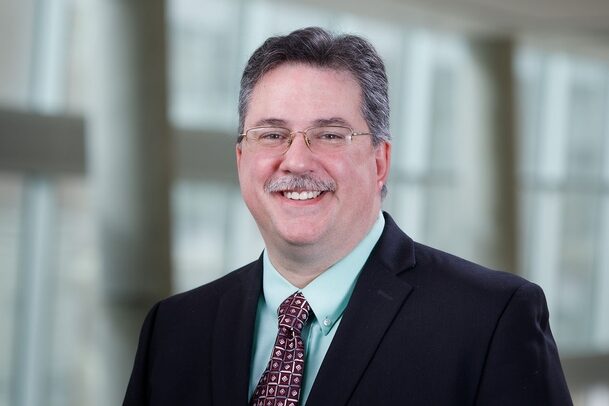A new National Institutes of Health grant for the Medical Scientist Training Program will bring more than $1.1 million to UNMC over the next five years.
With this award, UNMC joins about one-third of the approximately 150 medical schools across the country who have NIH-funded MD-PhD programs, said Justin Mott, MD, PhD, director of the MD-PhD Scholars Program in the UNMC College of Medicine.
“The NIH put out an announcement looking for programs that had something unique in terms of trainees who were underrepresented in medicine,” Dr. Mott said. UNMC’s strength, he said, is that approximately 20% of its applicants and 20% of its trainees have a rural background.
“At most medical schools, that number is about 5 or 6%,” he said.
In addition, more than 40% of participating college of medicine faculty have a rural background or their research and clinical populations relate to rural communities. And the program showed geographic diversity, with applicants from 42 states over the past five years.
A rural background can mean a great deal to a physician scientist, Dr, Mott said.
“Obviously, our experiences shape the questions that we ask,” he said. “Students from a rural background may be uniquely suited to ask questions about why health outcomes are not as good for members of the community who live in rural areas, why life expectancy is shorter, why there’s higher risk for some cardiovascular diseases and for some infections. What about the exposures about the culture, about the nature, of rural America is different? These scientists are ready to ask those questions.”
The strength of the program and its trainees also helped secure the funds, Dr. Mott said.
“The track record of our alumni matters a lot,” Dr. Mott said. “More than 92% of the students who come into our program stay and get both degrees, and that’s higher than the national average. And the time to achieve both degrees is at or slightly below the national average. Also, we’re setting our students up for success after they graduate.”
Trainee research strengths also reinforced program strengths. Dr. Mott said, pointing to two recent federal awards received by students:
- Aaron Schwab received a fellowship from the National Institute of Environmental Health Sciences this year, one of only two awards from NIEHS to UNMC currently, for a study exploring health impacts of agricultural dust exposures common in rural areas.
- Rebecca Slotkowski received a fellowship from the National Institute on Minority Health and Health Disparities in 2022, one of only four awards from the NIMHD to UNMC currently, to study a program designed to reduce sociodemographic impacts on cardiovascular risk and adverse maternal outcomes in young people in urban Omaha.
The LEAD MSTP award will allow the MD-PhD program to increase its annual cohort of accepted students from five to six, Dr. Mott said.
”This sounds like a small change, but over an eight-year program, it will increase our size to about 48 students. It also allows us to have additional support, not just through the NIH, but also through UNMC Graduate Studies, which has committed to supporting students during their graduate training based on this award.”
Dr. Mott expects the award will strengthen program recruitment, especially since grant reviewers pointed out the robust nature of the peer mentorship and scholarly community in the UNMC program.
UNMC College of Medicine Dean Bradley Britigan, MD, said the MD-PhD program is a source of pride for the college.
“From its inception, the MD-PhD program has nurtured physician scientists who have gone on to achieve great things,” Dr. Britigan said. “This new grant will allow it to grow even stronger.”
The large number of trainees with rural backgrounds grew organically, Dr. Mott said.
“This is not something that we select for in our admissions,” he said. “It’s more that the potential applicants are selecting for us. Our participating faculty, we’re about 40% who have either a rural upbringing or their clinic or their research have particular focus on rural communities. That provides an understanding, a shared background, a support system and a recognition of the value the students bring in. They may self-select into the program because of that.”
Dr. Mott credited his predecessors, Debra Romberger, MD, and Shelley Smith, PhD, for building the strong program, and thanked Dr. Britigan and Dele Davies, MD, the senior vice chancellor of academic affairs and dean of UNMC Graduate Studies, for their support.
Dr. Davies called the award “a national badge of excellence and a testament to the many years of hard work and foundation that has been laid by the dedicated faculty and leadership of the program in the college of medicine and the graduate studies program.
“This partnership has enabled our MD-PhD program to become recognized as among the very best in the country, based on the outcomes of our students and time to degree completion.”
Dr. Davies congratulated Dr. Mott and his team, as well as his predecessors, for “their concerted and relentless effort to make this training grant a reality. This institutional training grant adds to the growing strength of UNMC’s training programs dedicated to critical areas of research emphasis that will continue to help attract and train the next generation of scientists who will answer and solve the most pressing questions in health for generations to come.”
“The institutional support has been excellent across the board from the beginning of the program,” Dr. Mott said. “The integration between medicine and graduate studies facilitates the students’ growth as physician scientists, not sometimes a physician and sometimes a scientist. And that integration was a strength as we competed with other institutions for these funds.”
